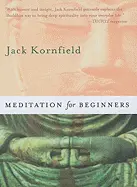
Meditation for Beginners - by Jack Kornfield
ISBN: 1591799422Date read: 2012-01-12
How strongly I recommend it: 5/10
(See my list of 430+ books, for more.)
Go to the Amazon page for details and reviews.
Just some nice thoughts on meditation.
my notes
To learn any important skill - whether it is playing the piano or meditation - it grows with perseverance, patience, and systematic training.
Develop a stillness in the midst of activity.
A way of being that we can carry with us every moment of our days.
Relax with uncertainty.
Mindfulness: a caring and respectful attention.
You do not have to fear that which is painful, and you do not have to grasp for that which is pleasant.
Open-hearted, and non-judgmental awareness of our bodies and our feelings.
See more clearly the people we live with.
A spiritual warrior’s life is an endless challenge, and challenges cannot possibly be good or bad. The basic difference between an ordinary person and a warrior is that a warrior takes everything as a challenge, while an ordinary person takes everything as a blessing or a curse.
Just learning to be kind.
What was necessary for a contemplative life was “a cup of understanding, a barrel of love, and an ocean of patience.”
Live more in the present moment and less and less in the place of forgetfulness or fantasy or memory.
If you experience itching, instead of immediately scratching the itch, you can simply note “itching, itching, itching.” Maybe for the first time in your life you can acknowledge the itch and feel what it is like and give it space to tingle and itch for some time without scratching it. Then you will also notice how it eventually passes away. This is true of every body sensation - whether it is coolness, or warmth, or tension, or pain.
A fly landed on my face. My first impulse was to brush the fly away. The fly stayed for at least ten minutes. During those ten minutes I was not planning, and I was not worrying about anything else. I was more present and centered and concentrated than if I had gone to a monastery for a month.
Even if you get what you think you want, it does not stop.
It is always something that we do not have in the present moment - something that we want to obtain in order to satisfy our longing.
You are not going to try to fulfill your desire, but you are going to sit and feel it and see its nature. You will watch it arise, you will feel what it is like in your body, and you will name it. Eventually it will pass away, and then you will see the next thing rise up. You will begin to see desire’s impermanent nature, and you will also realize that you do not have to act on every thought or desire.
Whatever it is saying this time, it is always just the wanting mind.
You have a choice: Will you get up? Sometimes getting up may be the right thing to do, and at other times you will recognize the qualities of the wanting mind and find a way not to have to follow it every time it arises.
Aversion, anger, or fear, the aspects of mind that judge or push away our experiences.
This includes judgment, which is also a kind of aversion: “That is bad. You are doing it wrong.”
Aversion and judgment also include fear: “I do not want to feel this. I do not like this.”
All of these are states of resistance.
Right before anger arises, there is often a sense of hurt or fear or loss. When you can feel that, you can notice how little compassion or kindness you have for yourself and others.
There is the judging mind. Everyone has one.
He was bragging that he had once caused a whole tribe of Bedouins to run. His friend asked him how the Mullah alone had made a whole tribe of wild bloodthirsty Bedouins do this. Nasrudin said, “It was simple. I ran and they all ran after me.” This is the way that fear works. The farther we run, the faster the fear comes to find us.
What makes these states so powerful is our resistance to them. But the moment you accept them, they lose a lot of their power. It is the resistance to them that makes them so difficult.
Thoughts do not last very long. Thoughts come quickly. Thoughts generally last just a few seconds. Body sensations tend to be a little slower. Moods are in the middle.
When sounds arise and interrupt you - like a loud car or someone coughing - then you can note those as “hearing, hearing.” It is important not to create a story about whether they are good or bad noises
The stories aren’t real - that each is a story that we insist on telling ourselves for a variety of reasons, but it is not what is happening in the moment. So we acknowledge the story as “remembering” or “planning”.
If it keeps coming back, it is often a signal that something wants to be felt or accepted. So if the thought keeps returning again and again, there is maybe a loss that needs to be acknowledged, or a love that wants to be accepted, or some creativity that wants to be recognized and honored in some way.
When we forgive others, we are able to release the past and start life anew. Without forgiveness, we are always left with “who did what to whom,” repeating the cycle.